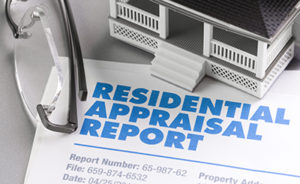What is An Appraisal?

When most prospective buyers consider buying a home, what they may not realize is that it could potentially be the greatest single investment they will ever make. Furthermore the purchase of real estate is a complex financial and legal transaction that requires many different people and organizations to complete. And each of these organizations has a different purpose and goal in the transaction. Knowing who all is involved and what each party hopes to get out of it is vitally important.
Most people are familiar with the role and purpose of a realtor and their primary job is to represent the buyer or seller and their interests in the purchase or sale of a property. The mortgage lender is the next party involved and they offer the financial capital required to actually purchase the home. Next, the title company presides over the sale by ensuring that a clear title is transferred from the seller to the buyer, funds to purchase are received, and all paperwork for the transaction is accurately completed.
But how does a buyer or seller actually know what the property is worth? And what kind of expert can they consult with? Well that’s where we come in. As appraisers, our job is to ensure that an accurate and impartial review of the property is completed prior to the sale so that all parties involved have a clear understanding of the true worth of the property prior to making any commitments or purchases.
THE INSPECTION
So what does the typical appraisal inspection consist of? When an appraiser arrives at a property, the main observations they make are of the property features (bedrooms, bathrooms, size, property location, etc.), finishes or upgrades (hardwood floors, vaulted ceilings, appliances, fireplaces, basement, etc.), and any existing hazards or repairs needed. During the inspection, the appraiser will take photos of each room and also make a sketch of the property with the dimensions and layout specified. Another important component of the inspection is to look for any defects, damages, or other factors that would affect the value of the property. Once a thorough inspection of the property has been completed, the appraiser can begin working on the appraisal report and determining the value of the property.
WRITING THE APPRAISAL REPORT
When an appraiser begins the process of writing the appraisal report, they must try to review as much information on the property as possible. They will review the property neighborhood, site zoning and utilities, and any improvements made to the property. After that, the appraiser can focus on three main categories which will help to arrive at the appraised value: Cost Approach, Sales Comparison, and Reconciliation.
Cost Approach:
With the cost approach, the appraiser determines how much it would cost for a reproduction or replacement of the property by reviewing local construction costs, labor rates, etc. This value helps to determine the maximum amount a home would be sold for.
Sales Comparison:
One of the benefits of using a local appraiser is that they are very familiar with the neighborhoods around them. The appraisers know the value and incentive of certain property features that homeowners want in that community or neighborhood. They know the major highways, traffic levels and noise, schools, hospitals, parks, etc. and they use that knowledge to ascertain property features that either attract or dissuade potential buyers from the sale of the property. And by comparing similar properties (“comparables” or “comps”) to the subject, they can begin to complete the sales comparison approach which gives a side-by-side assessment of all the different comparable properties.
Reconciliation:
Finally, the appraiser pulls in the information from the Sales Comparison Approach, Cost Approach, and Income Approach (for income producing properties) to help determine the estimated market value for the property. This section is also important because the appraiser articulates that the appraisal on the property is either written “as is” (in its current state) or “subject to” completion or repairs. Understanding how and why an appraiser wrote the report the way they did helps lenders, borrowers, realtors, and others involved in the process to be well informed of the true condition and worth of the property prior to making any important decisions.
Why Get An Appraisal?
 Appraisals have become a pivotal part of most real estate transactions. But there are other times when these services can be helpful.
Appraisals have become a pivotal part of most real estate transactions. But there are other times when these services can be helpful.
Property Tax Challenges
Challenging a tax assessment is something that many homeowners do routinely. But going up against an appeals board of this nature without appropriate documentation is ill-advised. An appraiser can help by providing a well-reasoned analysis that arms a homeowner with substantive proof of the value of their home.
PMI Removal
Private Mortgage Insurance (“PMI”) is the supplemental insurance that many lenders require home buyers to purchase when their down payment is less than 20% of the value of the home. Once the loan-to-value ratio conditions have been met, many homeowners employ the services of an appraiser to attest to the current value of the home. This allows the homeowner to seek to have the PMI payments removed.
Pre-Sale Evaluation
Among the decisions a homeowner must make before putting it on the market, the most common is “how much should I list it for?” Other homeowners find themselves making improvements to their home in advance of listing it in order to increase its value and return. Unfortunately, though, not all improvements add enough value to justify the expense. An appraiser can be extremely helpful in this situation. Local appraisers are typically well-acquainted with individual neighborhoods and can provide a realistic estimate of how much value can reasonably be expected from each improvement.
Estate Planning, Liquidation or Divorce
Appraisers can provide assistance in all stages of the homeowner experience, including during the difficult times. When decisions must be made about the disposition of a home or estate, an appraiser can bring an objective perspective to the table, allowing involved parties to reach a fair resolution.
Home Equity / Refinance
Historically low interest rates have been an impetus for many to refinance. River Crest can provide the appraisal services you need to complete this important process.
For Sale By Owner
If you decide to sell your home without the services of a real estate agent, having an appraisal completed is even more important. Potential buyers know that you have an emotional attachment to your home, and they may be reticent to take your word regarding the value of the home. Having a professional and objective opinion of your home’s value gives credibility to your listing price.
Appraisal Review
If you need a second opinion on an appraisal that’s been completed on your home or property, we offer a couple of different options. We can complete a desk review or a field review, depending on how thorough or specific you need the outcome to be.
Other appraisal uses include:
- To ascertain property value for the use of collateral or asset for a loan
- To provide a resource for decision making when purchasing or selling real estate.
- To obtain a home value for home insurance renewal
- To challenge or lower an increased or incorrect property taxes.
- To settle an estate.
- To comply with government requirements such as the IRS.
- To use if you are involved in a lawsuit.
How To Order An Appraisal?

What type of appraisal to order and who completes it?
So you’ve decided you’re ready to take the leap to purchase or sell your home. What next? The first question you should ask is “what is the property actually worth?” To determine that, you’ll need to order an appraisal, but which type? Should you order a desktop valuation, an exterior appraisal or a full interior appraisal? The answer depends on how in-depth you’d like the appraiser to go and the purpose of the appraisal. Do you just need a broad idea of your property value based on public records, or do you want the appraiser to actually drive by the property, or do you want the appraiser to see the interior finishes, room measurements, layout, etc.? Answers to those questions will help us determine which appraisal best fits your needs. When you contact our team at River Crest Appraisals we will make sure the appropriate appraisal professional (Certified General, Certified, or Licensed) completes the correct appraisal for you.
Cost & Delivery Expectations:
Depending on how in-depth the appraiser needs to go in the report will determine the amount of time and cost required to complete the appraisal. Please contact our office to go over pricing or visit the “Order Appraisal” page to process your order and view the appraisal fee. Standard delivery times vary depending on the location, time of year, and property complexity but generally are about 5 business days. Please feel free to contact us if you have any additional questions.
Where to place the order. Getting to know your appraiser:
You’ve come to the right place! To place your appraisal order, please click here to enter your property address, contact information, and to process your payment. We will contact you shortly to schedule your appraisal inspection.
